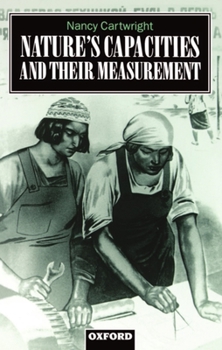Nature's Capacities and Their Measurement
Ever since David Hume, empiricists have barred powers and capacities from nature. In this book Cartwright argues that capacities are essential in our scientific world, and, contrary to empiricist orthodoxy, that they can meet sufficiently strict demands for testability. Econometrics is one discipline where probabilities are used to measure causal capacities, and the technology of modern physics provides several examples of testing capacities (such...
Format:Paperback
Language:English
ISBN:0198235070
ISBN13:9780198235071
Release Date:May 1994
Publisher:OUP Oxford
Length:278 Pages
Weight:0.84 lbs.
Dimensions:0.7" x 5.4" x 8.4"
Customer Reviews
1 rating
An important antidote
Published by Thriftbooks.com User , 24 years ago
Enter your average philosophy department with an express interest in causality and the chances are you'll run smack into a wall of statistical correllations, probability analyses and suchlike arcania. This book provides an important rallying point for dissenters from this orthodoxy. Yet, first appearances may deceive. With its mass of equations in the style of econometric path analysis and titles like 'How to get causes from probabilities', it does give the impression of being part of the disease and not the cure. But look closer - what Cartwright is arguing is that statiistical probabilities can provide evidence for causal connections only if the probability of the effect given the presence of the putative cause-factor is higher than the probability of the effect given its absence in all those populations that are homogeneous with respect to all other causal factors. We need to know both what all these other causes are and that they are not operating at this point in time before we can use statistics to measure causes. As Cartwright puts it, 'no causes in: no causes out'. And this is why what she is saying is so radical - not only must knowledge of these causes come from sources other than statistical data, but once they are known and known not to be operating then statistical data becomes an irrelevance as what the cause is will be obvious - it will be the variable that is left over. Tim Maudlin has criticised this account for insisting on conditions that no statistician could fulfill in practice. But, as I read it, that's precisely the point. And it is made by Cartwright with great verve and skill. Yet, it does rather surprise me that it has to be made at all. The language of causation is radically different from the language of statistical correllation - try to use the latter to measure the former and you end up eliminating causation altogether. Recognition of this simple point could avoid endless wasted publications that simply assume that causation is a statistical relationship. It could enable us to reflect more closely upon the different ways and circumstances in which we use the word 'cause' and to consider critically what our causal knowledge amounts to in each. Aside from a final chapter on abstractions that I still fail to see the point of, and some occasionally unclear remarks on the concept of causal capacities, this is an excellent contribution to an often dull field.






